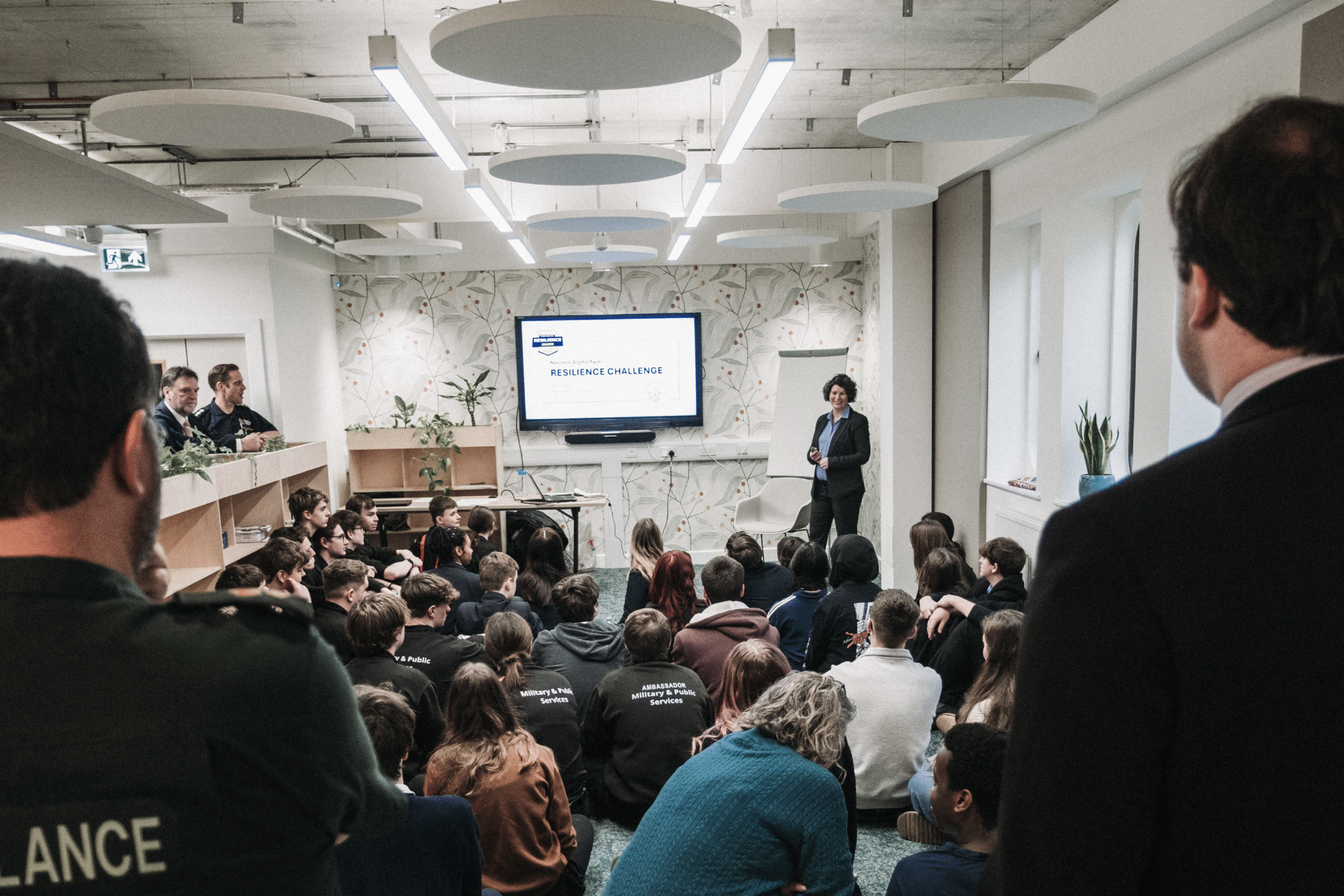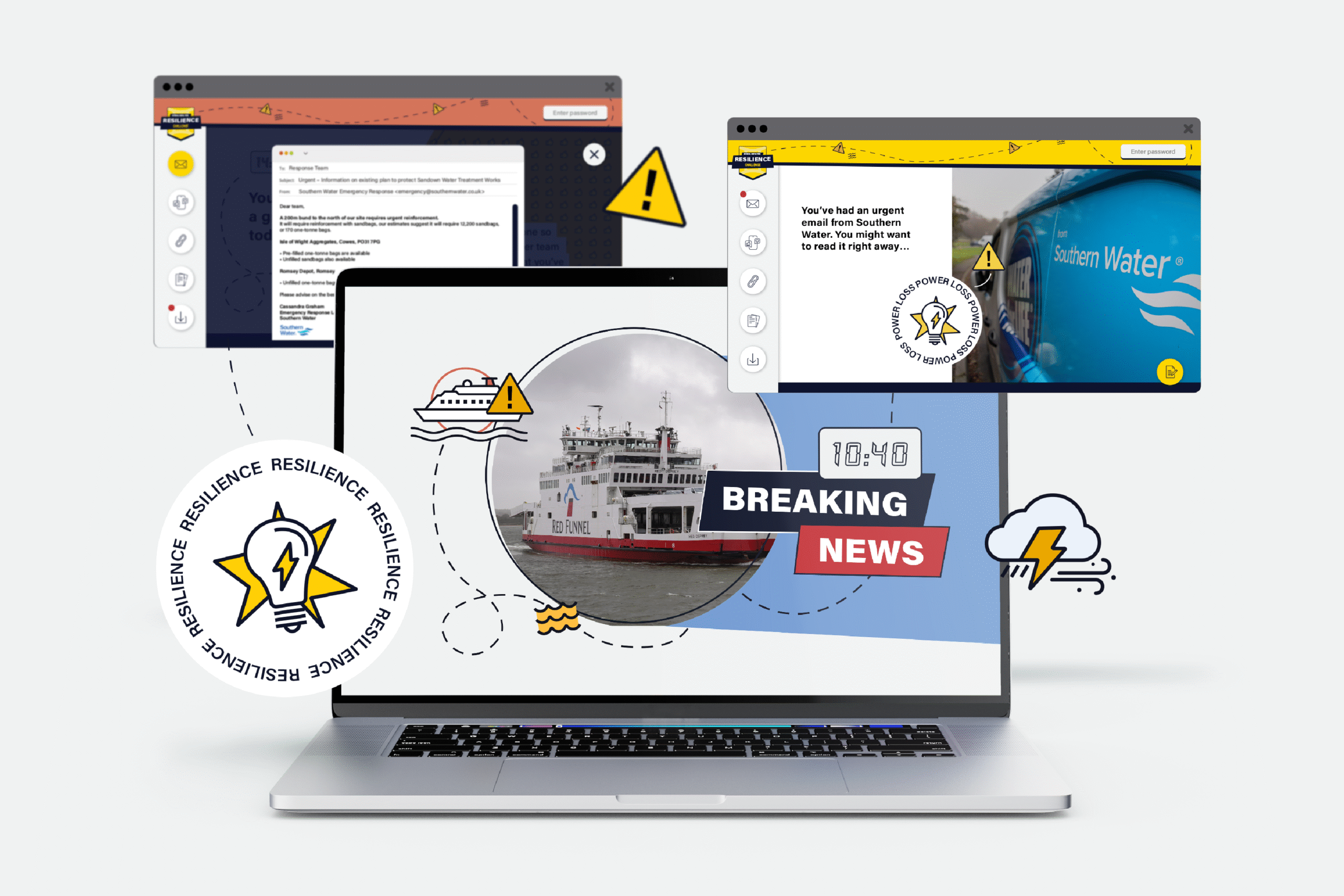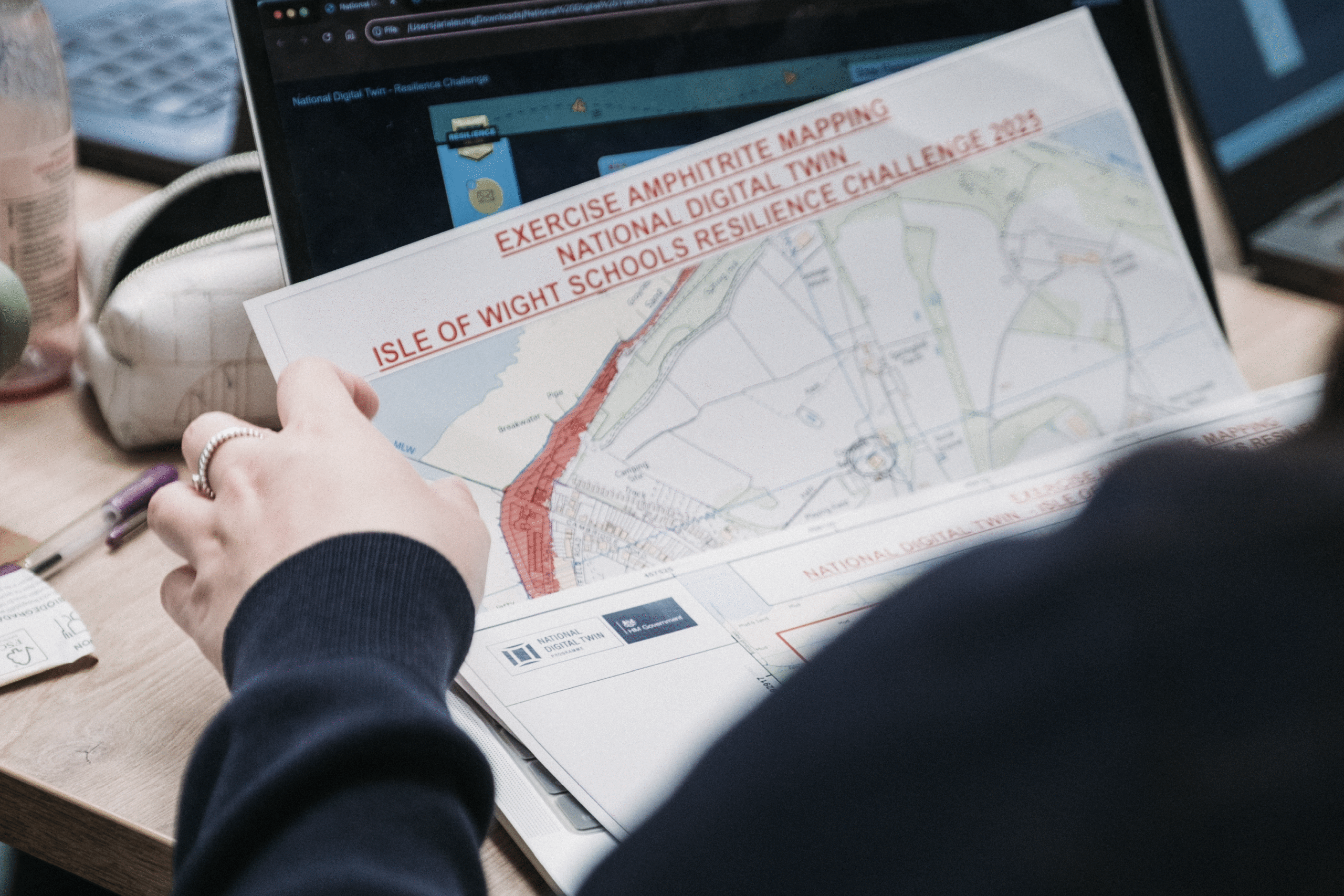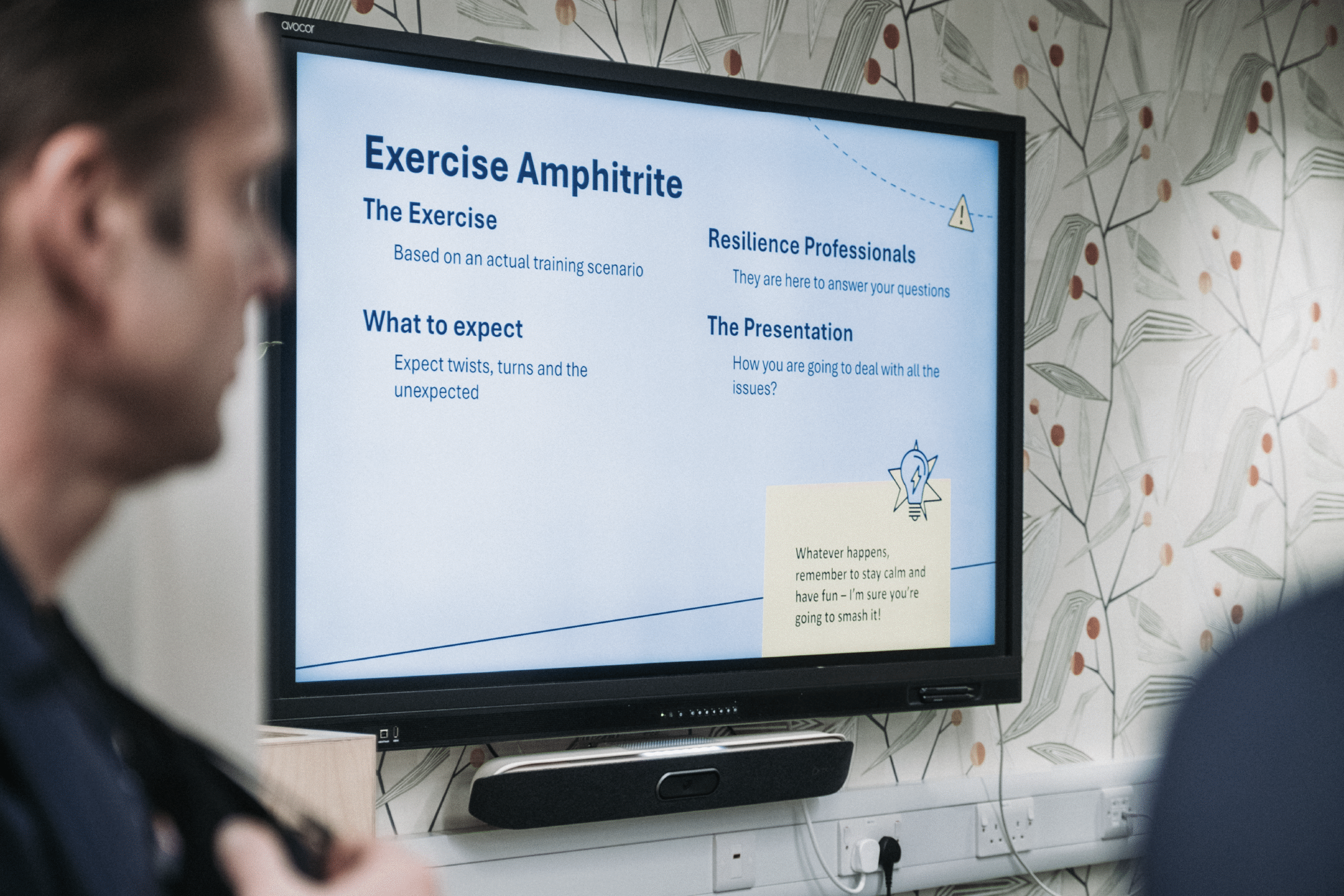The National Digital Twin Programme (NDTP) is an initiative aimed at enhancing information management and digital skills within the workforce. It focuses on developing educational resources, such as the NDT Resilience Challenge and the NDT Inter-Schools Competition, to engage students in gathering, analysing, and using information effectively. The programme promotes digital transformation and aims to ensure equitable access to digital twinning technologies across various sectors.
For educators
The NDTP recognises the vital importance of information management and digital skills for the next generation of the workforce.
As a result, the Programme is developing three assets:
-
the NDT Resilience Challenge;
-
the NDT Inter-Schools Competition; and
-
new modules that can be taught alongside and contribute to requirements of Key Stages.
Each asset will help students to develop problem-solving, digital resilience, and decision-making skills, equipping them for the future workforce and ensuring the benefits of digital transformation reach all parts of society.
All assets are being developed to be reusable so schools across the UK can independently run these initiatives. Currently they are being tested with a number of schools on the Isle of Wight with the support of the Isle of Wight Council Education Department.
The impact of this initiative is already widely recognised by participating schools, with many sharing their experiences and outcomes. Below are some examples of Resilience Challenge 2025:
The NDT Resilience Challenge
The NDT Resilience Challenge aims to engage with secondary schools and colleges to expand their understanding and skills in gathering, analysing and using information to inform decisions, as well as to decide what information needs to be disseminated to others at different times and how that should be done.
The Challenge is designed to be run as a two day event in which teams of students need to react to a major hypothetical incident scenario. By using a variety of sources, the students need to gather, manage, and verify information in order to map critical infrastructure, analyse its vulnerability and assess the impact of the situation. They then need to plan a course of action to manage the initial problem and wider changing circumstances, before presenting this to a judging panel.
The core takeaways for the students from their experience include learning:
-
How to find, organise and apply information in a time-critical environment
-
How to critically assess the reliability of information in a real-world scenario
-
How to work with professional subject matter advisors to help inform decisions
-
How to work effectively as a team to manage and complete a variety of tasks
-
How to present complex information in an effective way
The NDT Inter-Schools Competition
The NDT Inter-schools Competition involves students thinking about how different groups of users receive information, and the type of information that might be of most value to them.
The Competition is designed to take place over five weeks and takes students through some clear steps in the process of designing a technology solution – such as an app or website. The solution should help people to :
Teams aren’t expected to actually build their website or application, instead the Competition is being designed to give student insights into:
-
The real-world processes that go into a tech project
-
The key roles and responsibilities that contribute to the end product
-
The importance of understanding who the users are and what they need, before developing a solution to a problem
-
The difference between user interface (UI) and user experience (UX) – and how they shape digital engagement
-
The importance of accessibility requirements to make the final product work for as many people as possible
-
The value of realistic timeframes to help prioritise what is necessary over what is nice to have
Module development
The NDTP is in the process of developing curriculum content around information management. The material is based around being able to answer 6 questions:
For each of these questions a series of activities, currently aimed at KS3* Geography, have been developed. These are stand-alone activities which can slot into a scheme of learning, identifying the importance of information management within the topic.
The activities have been differentiated into three levels – Discover, Excel, Extend – with structured progression through the levels, with the high levels demanding deeper critical thinking and data evaluation.
Each activity makes use of real-world application of data analysis, decision-making, and communication to support project-based learning, teamwork, and cross-disciplinary thinking. and brings professional frameworks and concepts into the classroom.
Early testing on the content has commenced with some of the secondary schools on the Isle of Wight. This feedback is being built into the next stage of development which includes:
-
Broadening of curriculum alignment from just Geography to Science, and Information Management
-
Improving accessibility, including for those in special schools and for students with reading challenges in lower year groups or with Moderate Learning Difficulties
-
Construction of a digital platform which will support both teachers and students in practical use of the material
-
Integration of digital and interactive tools
* Key Stage 3 (KS3) refers to the educational stage in England for students aged 11 to 14, typically covering Years 7 to 9.
It is part of the National Curriculum and focuses on developing foundational knowledge and skills across various subjects, including Geography.
KS3 aims to prepare students for Key Stage 4, where they begin their GCSE studies. Activities designed for KS3 often emphasise critical thinking, problem-solving, and real-world applications of knowledge.
The National Digital Twin Programme (NDTP) is an initiative aimed at enhancing information management and digital skills within the workforce. It focuses on developing educational resources, such as the NDT Resilience Challenge and the NDT Inter-Schools Competition, to engage students in gathering, analysing, and using information effectively. The programme promotes digital transformation and aims to ensure equitable access to digital twinning technologies across various sectors.
The NDTP recognises the vital importance of information management and digital skills for the next generation of the workforce.
As a result, the Programme is developing three assets:
-
the NDT Resilience Challenge;
-
the NDT Inter-Schools Competition; and
-
new modules that can be taught alongside and contribute to requirements of Key Stages.
Each asset will help students to develop problem-solving, digital resilience, and decision-making skills, equipping them for the future workforce and ensuring the benefits of digital transformation reach all parts of society.
All assets are being developed to be reusable so schools across the UK can independently run these initiatives. Currently they are being tested with a number of schools on the Isle of Wight with the support of the Isle of Wight Council Education Department.
The impact of this initiative is already widely recognised by participating schools, with many sharing their experiences and outcomes. Below are some examples of Resilience Challenge 2025:
The NDT Resilience Challenge
The NDT Resilience Challenge aims to engage with secondary schools and colleges to expand their understanding and skills in gathering, analysing and using information to inform decisions, as well as to decide what information needs to be disseminated to others at different times and how that should be done.
The Challenge is designed to be run as a two day event in which teams of students need to react to a major hypothetical incident scenario. By using a variety of sources, the students need to gather, manage, and verify information in order to map critical infrastructure, analyse its vulnerability and assess the impact of the situation. They then need to plan a course of action to manage the initial problem and wider changing circumstances, before presenting this to a judging panel.
The core takeaways for the students from their experience include learning:
-
How to find, organise and apply information in a time-critical environment
-
How to critically assess the reliability of information in a real-world scenario
-
How to work with professional subject matter advisors to help inform decisions
-
How to work effectively as a team to manage and complete a variety of tasks
-
How to present complex information in an effective way
The NDT Inter-Schools Competition
The NDT Inter-schools Competition involves students thinking about how different groups of users receive information, and the type of information that might be of most value to them.
The Competition is designed to take place over five weeks and takes students through some clear steps in the process of designing a technology solution – such as an app or website. The solution should help people to :
Teams aren’t expected to actually build their website or application, instead the Competition is being designed to give student insights into:
-
The real-world processes that go into a tech project
-
The key roles and responsibilities that contribute to the end product
-
The importance of understanding who the users are and what they need, before developing a solution to a problem
-
The difference between user interface (UI) and user experience (UX) – and how they shape digital engagement
-
The importance of accessibility requirements to make the final product work for as many people as possible
-
The value of realistic timeframes to help prioritise what is necessary over what is nice to have
Module development
The NDTP is in the process of developing curriculum content around information management. The material is based around being able to answer 6 questions:
For each of these questions a series of activities, currently aimed at KS3* Geography, have been developed. These are stand-alone activities which can slot into a scheme of learning, identifying the importance of information management within the topic.
The activities have been differentiated into three levels – Discover, Excel, Extend – with structured progression through the levels, with the high levels demanding deeper critical thinking and data evaluation.
Each activity makes use of real-world application of data analysis, decision-making, and communication to support project-based learning, teamwork, and cross-disciplinary thinking. and brings professional frameworks and concepts into the classroom.
Early testing on the content has commenced with some of the secondary schools on the Isle of Wight. This feedback is being built into the next stage of development which includes:
-
Broadening of curriculum alignment from just Geography to Science, and Information Management
-
Improving accessibility, including for those in special schools and for students with reading challenges in lower year groups or with Moderate Learning Difficulties
-
Construction of a digital platform which will support both teachers and students in practical use of the material
-
Integration of digital and interactive tools
* Key Stage 3 (KS3) refers to the educational stage in England for students aged 11 to 14, typically covering Years 7 to 9.
It is part of the National Curriculum and focuses on developing foundational knowledge and skills across various subjects, including Geography.
KS3 aims to prepare students for Key Stage 4, where they begin their GCSE studies. Activities designed for KS3 often emphasise critical thinking, problem-solving, and real-world applications of knowledge.












